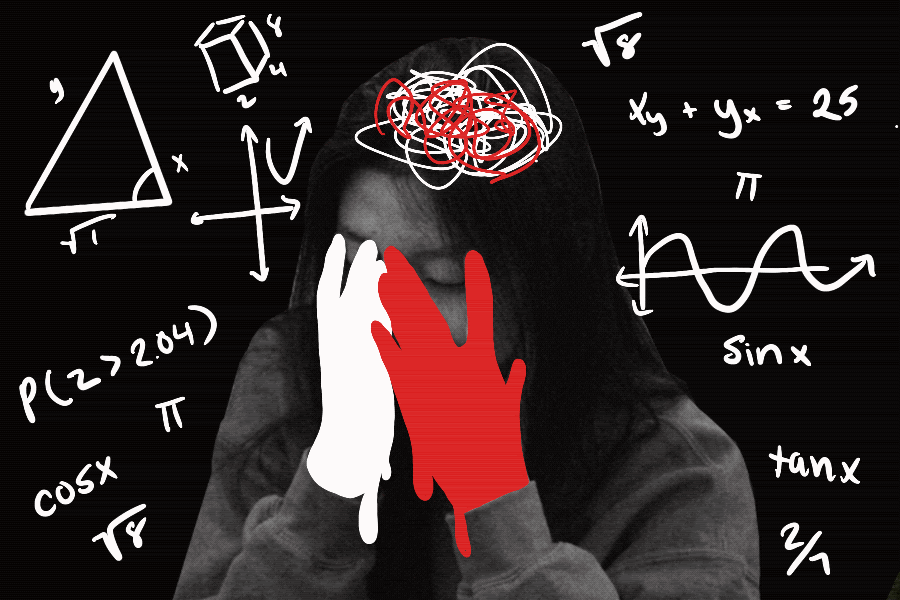Column: How math is taught just doesn’t add up
Photo by Charlotte Vanyo. Photo illustration by Shriya Vanparia.
Individuals with math anxiety are often unable to perform to their full ability due to the interfering symptoms of their anxiety. The Sidekick staff writer Joanne Kim reviews how math anxiety affects students’ performances within the classroom and discusses how the ways of teaching math should be changed.
March 2, 2020
I hate math.
I spend hours every day avoiding my math homework, then spend more hateful hours trying to understand concepts I was supposed to have learned weeks ago. And even after I manage to struggle my way to a marginal understanding of what I need to know, my efforts prove themselves futile when I actually have the test in front of me. What little I understand seems to hurl itself from my brain, and my mind completely blanks.
I thought all of this was due to my own inadequacy. I believed that for me, math is simply a subject I will never be good at.
It wasn’t until the beginning of this year that I understood these were all signs of math anxiety.
According to the American Psychological Association, math anxiety is “a feeling of tension and anxiety that interferes with the manipulation of numbers and the solving of mathematical problems in … ordinary life and academic situations.” The effects of math anxiety can range from a feeling of mild tension all the way to having a strong fear of math. However, math anxiety does not prove the existence of “math people” or “non-math people” who are innately good or bad at mathematics.
In fact, it is just the opposite.
People are mistakenly led to believe students with math anxiety perform poorly due to their incompetence, but this notion is incorrect. Individuals with math anxiety do not necessarily perform poorly due to lack of mathematical ability, but are actually unable to perform to their full ability due to the interfering symptoms of their anxiety. The correlation between high math anxiety students and low scores is often attributed to working memory.
Working memory plays a crucial role in concentration and following procedure, and it also has a limited capacity. When solving mathematical problems, this capacity is dedicated to problem-solving. However, in individuals with math anxiety, most of this space is instead taken up by anxious thoughts, thus compromising the individual’s ability to perform.
Now the question is, why do students develop math anxiety to begin with?
Math anxiety stems from a complex variety of factors including ones due to personality or one’s environment. Being unconfident and insecure definitely plays a role in the development of math anxiety, but so do classroom environments and teaching methods. The common core curriculum is ridiculous and only based on standards people in the government think are important, instead of what is actually practical — Sidaarth Sabhanani
“The common core curriculum is ridiculous and only based on standards people in the government think are important, instead of what is actually practical,” said Coppell High School junior Sidaarth Sabhanani, co-president of Mu Alpha Theta and head of operations for EZTutor. “The way people are taught math is really a whole bunch of busywork, which to your pragmatic and logical students makes sense, but to people who like being taught visually and creatively, it just doesn’t work. Even though I don’t suffer from it, I can definitely see how people would develop math anxiety.”
Of course, it will never entirely be a teacher’s fault a student may be anxious about math. Teachers, on top of having to deal with a bunch of hormonal teens, are obviously on a time crunch, are getting paid not-that-stellar salaries and are also trying to teach according to Texas Essential Knowledge and Skills (TEKS).
Still, the way math is taught and thought of should be changed, and that begins in the classroom. Thus, for the sake of their students, educators must consider how they can help mitigate the problem.
Oftentimes, what is apparently a logical procedure appears to me as a sequence of nonsensical steps I have to memorize in order to get to the right answer, and it is the same for many other students. To combat this, math classes should not be entirely based on memorization, good grades, speed and accuracy. Instead, classes should place more emphasis on understanding, rather than on rules and procedures.
In the real world, math is about problem-solving. If teachers and parents focus only on performance, grades or achievement of specific skills, students will believe their performance depends on their ability, and that their ability is not sufficient. It will also ingrain within children’s minds that it is not important how or why one reaches an answer as long as it is correct, which, of course, isn’t true at all.
This, in turn, can cause students to limit themselves and even turn away from career opportunities that focus on math in fear of being incompetent, when in reality, they would be able to perform just fine.
What math anxious students need are not more timed drills or quizzes. Students need to realize their ability is not predetermined and no one is born a “math person”. They have the strength to overcome their struggles.
For this to happen, students must not only be diligent in their work, but they must also be able to rely on the encouragement and support of everyone around them.
Until then, I’ll still hate math.
Follow Joanne (@joannekkim) and @CHSCampusNews on Twitter.











Joe • Mar 4, 2020 at 9:10 pm
You never have to memorize steps, you need to understand concepts. Also, you can never get an answer correct and always have straight As, the steps are always more important. You should never have to memorize anything (you can even derive formulas for shapes if your concepts are good enough) Speed and accuracy are vital, because everything you learn because 2nd steps in higher level math classes, and that is why there are drills and timed quizzes. Homework is only to reinforce concepts and improve speed. I can agree that the TEKs are useless, but that doesn’t mean everything in class is.
Tracy Tran • Mar 2, 2020 at 9:08 pm
Great job, Joanne. I love math but I also like your story.
Anthony Cesario • Mar 2, 2020 at 7:35 pm
Amazing story Joanne! I agree completely
Shivi Sharma • Mar 2, 2020 at 11:22 am
I love this story Joanne! Good job!
Camila Villarreal • Mar 2, 2020 at 10:45 am
awesome story joanne! i love it